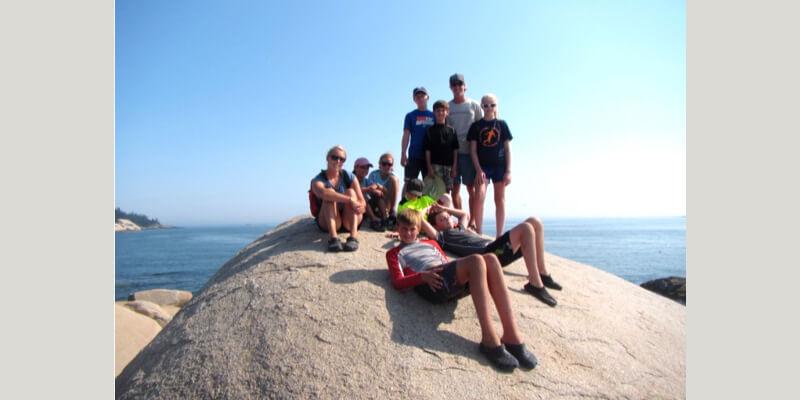Moving to the Atlantic Ocean from the shores of Lake Champlain is a big lifestyle change to make. But an even bigger change is living on a roughly 125 acre, off the grid island in the Gulf of Maine. This summer I had the opportunity to work and live on Hurricane Island as a science educator intern for the Hurricane Island Foundation Center for Science and Leadership. For ten weeks of the summer I switched out the mountains for the sea and taught high school and middle school students field sciences and leadership.
During my time on Hurricane, I was a program lead for three of our open enrollment programs. These week long programs teach students the importance of sustainability and teamwork and focus on an area of science that the island can offer as a classroom. I directly worked on the island ecology high school program. For these students we focused mainly on botany concepts and explored coastal forests as well as edibles that could be found on the island. The two middle school programs that I facilitated were titled "Living on the Edge" and explored everything the island could offer from marine ecology to botany to entomology and ornithology. All of the programs also included rock climbing off the face of the historic granite quarry cliffs and sailing our twin sail boats to learn nautical navigation, knot tying, and explore the differences in island biogeography.
Another large part of the education program I ran this summer was for an expedition organization called Overland. Nine times throughout the summer a group of roughly ten middle and high school students would stop for a couple of days on the island during their two-week trek of Maine. For my fellow educators and I, their stopover time was a chance to teach them leadership and communication skills and have them explore the island. We also led each of the groups through multi-day “Leave No Trace” workshops and by the end of the summer I had put in enough hours to be an official Leave No Trace Trainer.
The learning and growth I underwent during my time with the Hurricane Island Foundation is extensive and I am finding that the more time I have to reflect, the more I realize how much I really learned. I found that I was able to move away from a summer camp leader position and into a stronger educator role. I was influenced and mentored by my peers and supervisors on the island and learned so much by observing and teaching alongside them. I also broadened my knowledge of marine sciences and fisheries by living and working by the sea. Many of my fellow educators studied marine sciences and it was a great experience to have them teach me about the sea; in turn I taught them about the interior land of the island.
Entering into a small working community can be intimidating, especially when the boundaries between work and living are blurred by the space you have available. My advice for future interns would be to be as open to the community around you as much as possible and be ready and willing to learn from everyone around you. Ask lots of questions and if you have ideas of projects to do or ways to make things run smoother, don't be afraid to speak up!
